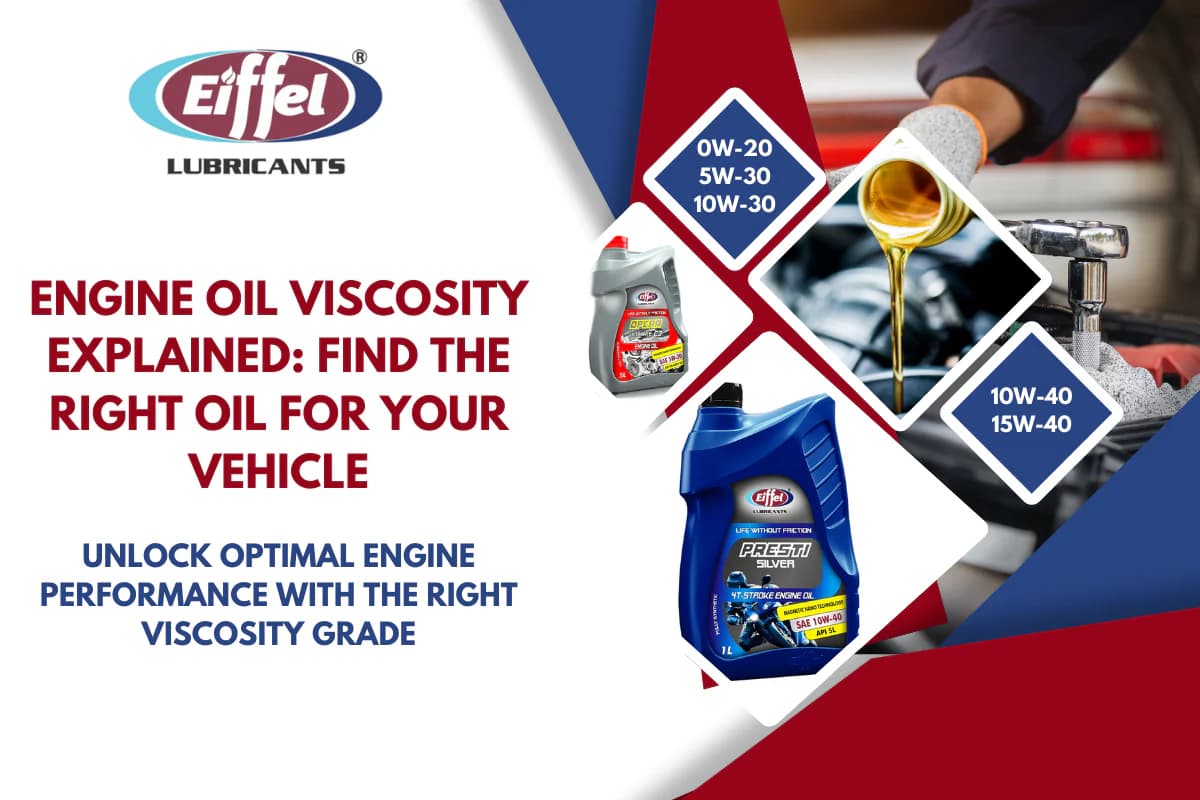Decoding Your Engine's Lifeblood: A Deep Dive into Oil Viscosity
Learn how viscosity grades like 5W-30 or 10W-40 influence cold starts, fuel economy, and engine longevity so you can confidently select the right Eiffel lubricant.
Share this article with your workshop crew or fellow drivers to spread the word on smarter maintenance.

Your car's engine is a complex symphony of moving parts, all working in harmony to get you where you need to go. And just like any orchestra needs a conductor, your engine needs oil to keep things running smoothly. But not just any oil will do. One of the most crucial factors in engine health is selecting the right oil viscosity, which is essentially a measure of the oil's thickness and its ability to flow under different temperatures. Understanding those mysterious numbers on the oil bottle, like 5W-30 or 10W-40, can be the key to unlocking optimal engine performance, maximizing fuel efficiency, and extending the life of your vehicle.
What Exactly is Oil Viscosity?
Imagine two liquids: honey and water. Honey, thick and slow-moving, has a high viscosity. Water, thin and free-flowing, has a low viscosity. Engine oil's viscosity works similarly. It describes the oil's resistance to flow. This characteristic is critical because the oil needs to be thin enough to circulate quickly during cold starts, yet thick enough to provide a protective layer between moving parts when the engine is hot.
Cracking the Code: The SAE Viscosity Grading System
The Society of Automotive Engineers (SAE) developed a standardized system to classify oil viscosity, making it easier for consumers and mechanics to choose the right product. These grades provide a clear picture of how the oil will behave at both low and high temperatures.
The Numbers Game: Understanding What Each Digit Means
Let's break down a typical viscosity grade, like 10W-30:
- The First Number (e.g., 10W): This indicates cold weather performance. A lower number here signifies better flow in cold conditions. For instance, 5W-30 oil flows more readily at startup than a 10W-30 oil.
- The Second Number (e.g., 30): This represents viscosity at normal operating temperature. A higher number indicates a thicker oil at operating temperature.
Multi-Grade Oils: The Best of Both Worlds
Most modern engines rely on multi-grade oils like 5W-30. These oils are engineered to perform well across a broad spectrum of temperatures, thanks to special additives called viscosity modifiers.
Temperature's Influence on Viscosity
Temperature significantly impacts oil viscosity. As the temperature climbs, the oil thins out and flows more easily. Conversely, as the temperature drops, the oil thickens and flows more sluggishly. This is why choosing the right viscosity grade is paramount for optimal engine protection and performance, no matter the weather.
Choosing the Right Viscosity: A Balancing Act
Selecting the ideal engine oil viscosity depends on several factors:
- Manufacturer Recommendations: Always refer to your vehicle's manual.
- Climate: Colder climates benefit from oils like 5W-30 for better cold starts.
- Driving Habits: Stop-and-go driving may require a different oil than long highway trips.
- Engine Age: Older engines might need a higher viscosity oil.
Viscosity Grades at a Glance
| Viscosity Grade | Cold Weather Performance | Hot Weather Performance | Common Uses |
|---|---|---|---|
| 0W-20 | Excellent in extreme cold | Thinner at operating temperature | Newer engines, cold climates |
| 5W-30 | Good cold start performance | Balanced for varied conditions | Most vehicles |
| 10W-30 | Moderate cold weather flow | Better protection in heat | Older engines, moderate climates |
| 10W-40 | Moderate cold weather flow | Thicker at high temperatures | High-performance engines |
| 15W-40 | Poor cold performance | Very thick at high temperatures | Heavy-duty applications |
The Consequences of Choosing the Wrong Viscosity
- Increased Engine Wear: Oil that's too thick might not reach vital parts in time; oil that's too thin might fail under heat.
- Reduced Fuel Economy: Thicker oils increase engine drag, reducing efficiency.
- Overheating: Poor oil circulation can cause heat buildup.
- Potential Oil Leaks: Thin oils might leak through worn seals.
- Noisier Operation: Incorrect viscosity can increase engine noise.
Eiffel Lubricants: Your Partner in Engine Health
At Eiffel Lubricants, we understand the critical role that engine oil plays in maintaining the health and performance of your vehicle. Our range of high-quality lubricants is designed to meet the specific needs of different engines and operating conditions. Visit our Engine Oil Collection to explore our products or contact us for expert advice.
Final Thoughts
Choosing the right engine oil viscosity is a crucial aspect of vehicle maintenance. By understanding the factors that influence viscosity and the information conveyed by the SAE grading system, you can make an informed decision that will protect your engine, optimize its performance, and contribute to its longevity. Trust Eiffel Lubricants Shop for all your engine oil needs.
Continue learning
Explore the rest of our guides to keep your engine protected and performing at its best.
February 3, 2025
5W30 vs 10W30: Decoding the Oil Viscosity Mystery
Get a friendly breakdown of what separates 5W30 from 10W30, how viscosity impacts cold starts and warm protection, and which oil fits your vehicle's needs.
Read articleAugust 6, 2024
Fully Synthetic vs. Conventional Engine Oil: Which is Right for You?
Weigh the benefits of fully synthetic versus mineral oil, from longevity and extreme temperature performance to maintenance budgets and environmental impact.
Read articleAugust 5, 2024
The Ultimate Guide to Choosing the Right Engine Oil for Your Car
Understand viscosity grades like 5W20, 10W30, and everything in between so you can match the right engine oil to your driving conditions and manufacturer guidance.
Read article